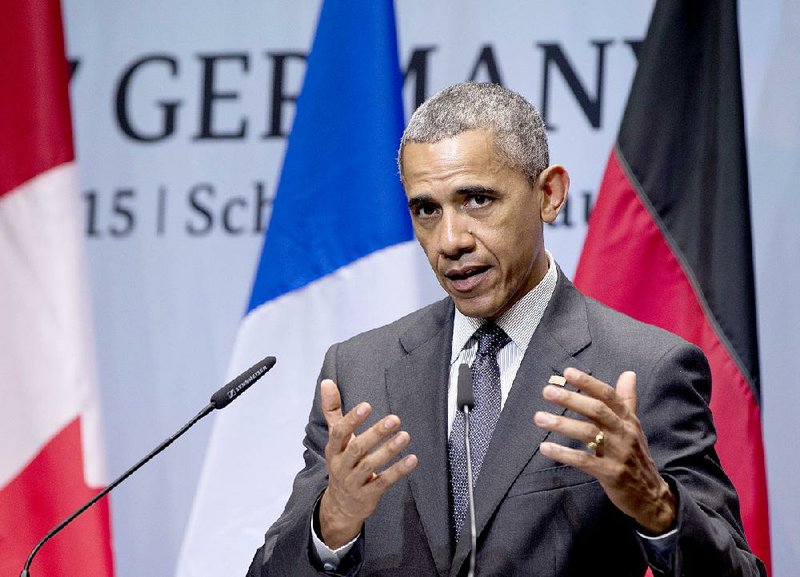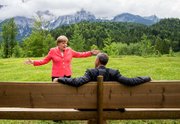KRUN, Germany -- President Barack Obama said Monday that he had asked the Pentagon for a plan to accelerate the U.S. military's efforts to train and equip Iraqi forces fighting the Islamic State, acknowledging that the militant group's recent gains indicate a need for a shift in strategy.
RELATED ARTICLES
http://www.arkansas…">U.S. raid in Syria yields information on Islamic State's inner workings http://www.arkansas…">G-7 leaders set fossil-fuels goal
"We don't have, yet, a complete strategy because it requires commitments on the part of Iraqis as well," Obama said at the close of a summit of the Group of Seven world leaders in Germany. "The details are not worked out."
Obama said of the militants of the Islamic State, also known as ISIL and ISIS: "They're nimble, and they're aggressive, and they're opportunistic."
He said it was important to more quickly train Iraqi forces to better fight the Sunni militants. But he acknowledged that the training "has not been happening as fast as it needs to." And he said the United States has "made some progress, but not enough" in stemming the flow of foreign fighters into Iraq and Syria.
Obama said "thousands" of new fighters were replenishing the ranks of the Islamic State faster than the coalition could remove them from the fight.
"If we can cut off some of that foreign fighter flow, then we are able to isolate and wear out ISIL forces that are already there," Obama said. "Because we are taking a lot of them off the battlefield, but if they're being replenished, then it doesn't solve the problem over the long term."
Earlier Monday, Obama met with Prime Minister Haider al-Abadi of Iraq, where he reaffirmed the world powers' commitment to supporting Iraq in the fight against the Islamic State, which has made major gains in recent weeks.
"Although it is going to take time, and there will be setbacks and lessons learned, we are going to be successful," Obama said at the start of a meeting with al-Abadi. "ISIL is going to be driven out of Iraq, and ultimately, it is going to be defeated."
In the meeting, the president's first with al-Abadi since Islamic State fighters took control of the Iraqi city of Ramadi, Obama called the prime minister a reliable partner and praised his "refreshing honesty" in acknowledging the challenges of confronting the militant group.
Noting that the militants have been displaced in some areas but then have occupied others, such as Ramadi, he said: "So, one of the areas where we're going to have to improve is the speed at which we're training Iraqi forces. Where we've trained Iraqi forces directly and equipped them, and we have a train-and-assist posture, they operate effectively."
The president said he believed the militants' takeover of the capital of Anbar province was "a short-term tactical success" and said his administration was working to determine how to get more weapons into the hands of Iraqi forces who are prepared to fight the Islamic State on a timely basis.
But "one of the things that we're still seeing is, in Iraq, places where we've got more training capacity than we have recruits," Obama said.
With the Sunni militants racking up gains in Iraq and Syria, G-7 leaders used the meeting as a chance to restate their commitment to the U.S.-led coalition seeking to help stop the group. British Prime Minister David Cameron announced the day before that Britain will deploy an additional 125 members of its armed forces to train Iraqis in dealing with improvised bombs and general logistics.
But al-Abadi has said that the assistance is not enough.
On Monday, he said he needed help assembling a "global intelligence-sharing effort" to try to thwart the Islamic State's recruitment efforts, saying the scores of foreign fighters streaming into Iraq and Syria to carry out suicide bombings and other attacks were an increasingly grave threat.
"The problem resides with the foreign fighters who create more of the bloodshed and destruction," he said.
Obama agreed with al-Abadi's assessment, saying that the international community had "made some progress but not enough" on stopping the flow of the fighters. He said Turkey, which shares a border with Syria and Iraq, hasn't "fully ramped up" efforts to close the border.
To stop the movement, the United States and its allies will need to do a better job with intelligence sharing and border security, al-Abadi said. "This will require the effort and the mobilization of the international community."
He also said the key to resolving the conflict was convincing Sunnis, who felt marginalized and under attack by al-Abadi's predecessor, that they have a place in the government.
"The political agenda of inclusion remains as important as the military fight that is out there," Obama said. Although he praised al-Abadi for reaching out to disaffected Sunnis, the president noted that he had inherited a lot of "mistrust."
Al-Abadi said he is working on "including all components of Iraqi people" in the government and the fight against the militants.
On a visit to Washington, Saleem al-Jubouri, the speaker of the Iraqi Parliament and the country's highest-ranking Sunni politician, said the U.S. must press the Shiite-dominated government to bring more Sunni forces into the fight.
Legislation to create a national guard that would bring Sunni and Shiite militias under the control of the government has been slowed in parliament by sectarian rivalries.
Al-Jubouri said Monday that those forces can become a focal point of the battle against Islamic State.
"It is possible, very possible, to have forces composed of tribes that are trained and equipped and receive all the support they need and can perform the task of fighting Daesh," al-Jubouri said, using the Arabic acronym for Islamic State. "The U.S. can definitely very clearly help in this respect."
Obama endorsed the goal of completing the national guard legislation so that more Sunni forces can be brought to the fight.
Leaders attending the G-7 summit in the Bavarian Alps focused part of their agenda on counterterrorism and other global threats. Along with al-Abadi, Nigerian President Muhammadu Buhari was invited to discuss efforts to counter Boko Haram in his country.
Russia sanctions
While the campaign to defeat the Islamic State was part of the summit's crowded agenda, the G-7 leaders from the U.S., Canada, the United Kingdom, France, Germany, Italy and Japan dominated their meetings with how to address Russia's continued aggression in Ukraine.
Obama used the gathering of leaders of the major industrialized countries to prod his European counterparts, who are facing calls at home to pull back their economic sanctions on Moscow, to keep the penalties in place to maintain pressure on Russia to halt its moves in Ukraine.
At a news conference after the two days of meetings, Obama indicated that it was possible to expand the existing sanctions if President Vladimir Putin of Russia fails to fulfill a cease-fire agreement negotiated in Minsk, Belarus.
He said there has been "discussion about additional steps that we might need to take if Russia, working through separatists, doubled down on aggression inside of Ukraine."
Obama said his European counterparts have made it clear that "if necessary, we stand ready to impose additional significant sanctions against Russia." And he challenged Putin to back down in Ukraine or risk dire consequences to Russia's economy.
"He's got to make a decision: Does he continue to wreck his nation's economy and continue Russia's isolation in pursuit of a wrongheaded desire to re-create the glories of the Soviet empire?" Obama said. "Or does he recognize that Russia's greatness does not depend on violating the territorial integrity of other countries?"
This year's summit marked the second in a row to which Putin and Russia were not invited.
The European Union is scheduled to vote later this month on whether to extend the sanctions, and the language used by the leaders was an important marker, indicating that they are willing to maintain sanctions even in the face of domestic criticism.
EU leaders at the G-7 summit affirmed Obama's stance that sanctions would remain in place and could be stiffened, as long as Moscow continues its "trans-border support of separatist forces" in Ukraine.
Information for this article was contributed by Julie Hirschfeld Davis and Michael D. Shear of The New York Times; by Greg Jaffe, Juliet Eilperin and Anthony Faiola of The Washington Post; and by Justin Sink, Mike Dorning, Angela Greiling Keane, Nicole Gaouette and Robert Hutton of Bloomberg News.
A Section on 06/09/2015



